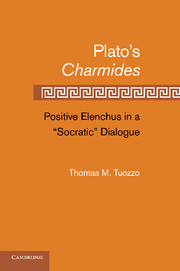Book contents
- Frontmatter
- Contents
- Acknowledgments
- Part One Approaching The Dialogue
- Part Two Approaching The Argument
- Part Three The Dialectical Investigation
- 5 σωϕροσύνη and Its Value
- 6 σωϕροσύνη as Self-Knowledge: Two Reformulations
- 7 Possibility of Self-Knowledge: Critian Formulation
- 8 Possibility of Self-Knowledge: Socratic Formulation
- 9 Return of the Value Question
- 10 Socrates??? Final Speech and Closing Scene
- 11 σωϕροσύνη, Knowledge, and the Good
- Works Cited
- General Index
- Index of Passages
9 - Return of the Value Question
Published online by Cambridge University Press: 05 February 2012
- Frontmatter
- Contents
- Acknowledgments
- Part One Approaching The Dialogue
- Part Two Approaching The Argument
- Part Three The Dialectical Investigation
- 5 σωϕροσύνη and Its Value
- 6 σωϕροσύνη as Self-Knowledge: Two Reformulations
- 7 Possibility of Self-Knowledge: Critian Formulation
- 8 Possibility of Self-Knowledge: Socratic Formulation
- 9 Return of the Value Question
- 10 Socrates??? Final Speech and Closing Scene
- 11 σωϕροσύνη, Knowledge, and the Good
- Works Cited
- General Index
- Index of Passages
Summary
The Dialectical Situation
When Critias introduced the definition of σωϕροσύνη as self-knowledge, he supported it with a speech about the inscription at Delphi, “Know thyself.” This inscription, Critias says, represents the god’s criticism of the standard human greeting, “Enjoy thyself,” and his recommendation that it be replaced with an exhortation to self-knowledge, which, as Critias explains, amounts to an exhortation to be temperate (σωϕρονεῖν). Subsequent worshipers at Delphi mistook the inscription as a piece of useful advice and added a few more: “Nothing too much” and “Give bond, and ruin follows.” But a greeting is different from a piece of advice, Critias insists. In Chapter 5 I developed an account of that difference according to which a greeting refers to a good that has a more fundamental role than that to which pieces of advice make reference: a good the joint dedication to which makes possible the social context within which alone the pursuit of other goods is possible. However exactly the difference between greeting and advice is to be understood, it is clear from Critias’ Delphic speech that Critias believes self-knowledge is recommended to us by the god because of its very great value.
- Type
- Chapter
- Information
- Plato’s CharmidesPositive Elenchus in a 'Socratic' Dialogue, pp. 255 - 286Publisher: Cambridge University PressPrint publication year: 2011



